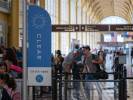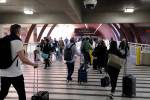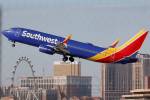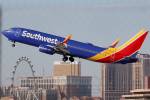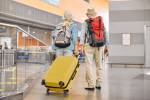Fliers could face delays
For thousands of Thanksgiving airline passengers, today's National Opt-Out Day, an organized, grass-roots protest that began online a little more than two weeks ago, could be a traveling headache leading to long delays at airport checkpoints.
Its organizers say they simply want to focus anger against the Transportation Security Administration's enhanced security procedures, which were instituted after a failed terrorist plot late last month to blow up cargo planes en route to the United States.
At McCarran International Airport, TSA spokesman Dwayne Baird said the agency will have "all hands on deck" today, but the full staffing has nothing to do with the effort to persuade passengers to opt out of using the full-body scanners.
"It's the busiest travel day of the year," Baird said. "Every available person will be working the checkpoints at the airport, and we would be doing that no matter what."
Transportation Security Administrator John Pistole said Tuesday that the agency is asking government security experts whether there is a way to make the security pat-down less invasive but just as thorough. He said there are no modifications planned yet for the invasive pat-downs, which make some air travelers uncomfortable.
Also Tuesday, the TSA confirmed that flight attendants are joining pilots in skipping the new enhanced security procedures. On Friday, the TSA said pilots could avoid the more intense screening, including the scanners. Flight attendants argued that they also should be exempt.
TSA spokesman Nick Kimball confirmed Tuesday that flight attendants and pilots will be treated the same. Both groups must show photo ID and go through metal detectors. If that sets off an alarm, they might still get a pat-down in some cases, he said. The rules apply to pilots and flight attendants in uniform when they're traveling.
The opt-out campaign is a rebellion in which passengers say no to the roughly 400 imaging machines in use at nearly 70 airports nationwide and opt instead for a public frisking, which has been criticized as being too invasive because sliding hands probe clothed genitalia and breasts.
"I just want to know if the TSA workers actually believe they are keeping people safe by feeling us up if we opt out of the full-body scan," said Cara Eshleman of Arlington, Va., who is flying today from Reagan National Airport and will opt out if she is directed to a full-body scanner.
One unruly passenger or several travelers opting out could spell a long day at the airport for many others. A full-body imaging scan normally takes between 15 and 30 seconds . A full-body pat-down by a security official takes at least twice as long, between one and two minutes on average, according to videotapes of the frisks.
Baird said McCarran passengers who refuse the scanner and the pat-down will have to find another mode of transportation to reach their destination.
It is unknown whether enough protesters will show up at McCarran to cause major delays in the security lines, but airport officials are urging passengers to arrive early anyway because the airport will be busy.
"We're going to deal with it as it comes," Baird said. "We hope people understand the idea is that we want to get travelers to their destination as safely and securely as possible. They can opt out of the procedure altogether ; they just won't fly."
Review-Journal writer Adrienne Packer and The Associated Press contributed to this report.























